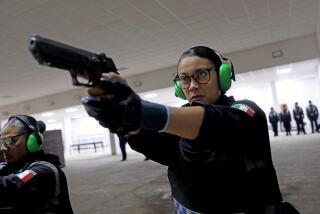The Right Tool for the ‘Yob’?
- Share via
LONDON — The headline screamed: “Girl Who Killed for Kicks Aged 14.”
The girl in question, green-eyed, auburn-haired Chelsea O’Mahoney, and her crew went on a “happy slap” rampage along London’s South Bank one night 15 months ago. In less than an hour, they beat, kicked and stomped eight random victims. O’Mahoney filmed it with her cellphone to add to the teenage gang’s only motive -- thrill.
One man died. O’Mahoney, the daughter of a heroin addict who was abandoned to the grim streets of her housing project when she was just 3 and spent the years that followed in a succession of foster homes, was sentenced last month to eight years in prison.
The attacks, like something out of “A Clockwork Orange,” were an extreme example of a phenomenon that has become a boogeyman of public consciousness in Britain: “yobbery,” the arrival of a generation believed to be so alienated from the norms of civilized society that decent people must live in fear. The word comes from the old slang term “yob,” or “boy” spelled backward, which used to mean a working-class male but now is more commonly used as a synonym for thug or hooligan.
The governing Labor Party believes that antisocial behavior is the No. 1 issue on Britons’ minds, more pressing even than concern about the economy, global warming and the war in Iraq. An almost daily diet of sensational street crimes, such as the January robbery and killing of a young banker at an unstaffed London train station, is intensifying public worry.
As defined by the government, antisocial behavior can be mundane: public drunkenness or urination, neighbors refusing to turn down their stereos and teenagers hanging outside shops, intimidating prospective patrons.
At its extreme, however, it can encompass serious crimes such as assault, robbery and arson. In one recent example, an intoxicated, drugged-up man celebrating his 23rd birthday on a pub crawl plunged from a balcony and fell on a 30-year-old woman. She was left paralyzed for life, and he was sent to prison for two years for causing grievous bodily harm.
To address anxieties, Prime Minister Tony Blair unveiled a 40-page “respect” action plan in January to intervene in the day-to-day lives of errant families before they, and those around them, are undone by bad behavior.
The most striking part of his plan was his announcement that families who are so out of control that they terrorize their neighborhoods could be evicted from their homes.
Whether they own or rent, these run-amok families could be put temporarily into supervised accommodations to undergo a barrage of reeducation. Parents would be shown how to raise their children, and young people would be trained to live in a society of rules.
Newspapers dubbed the supervised residences “sin bins,” even as the idea drew protests from children’s advocates and civil libertarians, concerned that the government was overemphasizing punishment and paying too little attention to the root causes of delinquency and crime.
In many cases, it takes close involvement on an individual basis, and a lot of patience, to turn people around, said Slaney Wright, a project manager at Fairbridge in London, which works with young people grappling with a range of difficulties -- legal, educational, social.
“It’s brilliant that these things are being brought to the front of the public mind and being discussed,” she said of the government’s campaign against antisocial behavior. “But the risk is that it will further demonize young people, which makes their lives a lot more difficult and restricts their opportunities a lot more.”
One of Fairbridge’s clients is Marcia Brown, a 15-year-old who had been thrown out of her school for misbehaving and arguing with teachers. Young people are tired of being talked down to, she said.
A resident of the Kilburn neighborhood housing project, Marcia described a London seldom seen by visitors. It’s an “Up the Down Staircase” world in which almost all youths use drugs, swear at or ignore their teachers, are labeled “geeks” if they want to learn and risk a daily gantlet of guns, gangs and “happy slap” assaults on the streets.
Such attacks typically involve unprovoked slaps or punches for the offenders’ fun and the victims’ humiliation. The events are usually photographed for bragging purposes.
In such a tough world, kids could use more sympathy, Marcia said. “Some adults or teachers tend to take the mick out of children -- like, ‘You’re so small, you’re lower-class to us so we have to treat you with no respect. You have no feelings, so just move aside. That’s why kids sometimes get sick and tired of that treatment, and sometimes they actually do like respect.”
But she said that thanks to the guidance and support given to her and other inner-city youths by Fairbridge, a charity in her neighborhood funded largely by the Royal Bank of Scotland Group, she has changed her view of education.
Now she attends classes four days a week and plans to go to acting school. She does not want to end up sweeping floors, she said.
“You’ll see me in Hollywood in about three years,” she predicted with a smile.
To create more turnarounds like Marcia’s, Blair’s plan includes programs to support young people and troubled families, but they are coupled with tough enforcement of decent behavior, even if that means eroding the standard of innocent until proved guilty.
“We need a radical new approach if we are to restore the liberty of the law-abiding citizen,” Blair said, echoing the same hard line in regard to civil liberties that he has taken in the fight against terrorism. “Freedom to be safe from fear has to come first.”
The Blair government has had antisocial behavior in its sights since it came to power in 1997, introducing Anti-Social Behavior Orders, which can be requested by police or local authorities and imposed on youths or adults, mandating the cessation of specific behaviors. Their acronym, ASBO, has even entered the public lexicon, used as a noun, verb or adjective. “ASBO Landlord Pleads Guilty,” for example, or “He’s been ASBOed three times.”
Officially, antisocial behavior is any activity that causes or is likely to cause harassment, alarm or distress, and ASBOs are a way to deter or terminate it short of arrest. “The challenge is to create and, where needed, enforce a modern culture of respect which the majority of people want,” Blair explained when he unveiled his latest plan.
For instance, an ASBO might force a 15-year-old accused of vandalism or violence to stay away from a particular street for two years. If the ASBO is violated, the offender could find himself in criminal court and sentenced to prison for up to five years.
Similar orders might fine parents who fail to ensure that their children are in school every day, for instance.
So far, more than 6,500 ASBOs have been issued, 43% of them against juveniles, including children as young as 10. There has even been discussion about introducing orders applying to the under-10 set, known as baby ASBOs.
However, there is no clear indication that ASBOs and other orders are putting a dent in youth crime. According to government statistics, the overall crime rate has been dropping but the proportion of crimes by young people has stayed steady. However, certain categories, including street muggings, have been rising, which may explain why three-quarters of respondents in a recent university research survey believed the number of young offenders was going up.
Bob Reitemeier, head of the Children’s Society, one of the main nongovernmental groups that work with troubled teens, says the approach is bringing an unintended backlash. Some young people deliberately accumulate ASBOs to be cool, he said, and wear them as a “badge of honor” in certain neighborhoods.
When ASBOs were introduced, he said, people thought they would be used mainly to control adults rather than targeting so many young people. They simply do not make sense for the typical teenager, who is by nature prone to make mistakes on the road to adulthood, he argued.
In general, ASBOs work like traffic citations. They can be based on suspicion or hearsay evidence -- although offenders have the right to appeal to a judge. Like a modern-day “scarlet letter,” they are supposed to carry a public stigma and the presumption of guilt.
Besides ASBOs, the government has endorsed curfew and dispersal orders, on-the-spot fines for people accused of creating a public nuisance and sealing up suspected drug houses. Such steps are meant to compel recalcitrant troublemakers to conduct themselves in a more civilized manner without loading down the courts.
In announcing the barrage of measures, Blair laid out his rationale, saying respect has broken down and societal bonds that once served as a check on incorrect or abusive behavior have disappeared.
The criminal court system can’t be the substitute, he said. In today’s large, diverse society, prosecuting minor crimes is too costly and cumbersome for the police and courts. “To get on top of 21st century crime, we need to accept that what works in practice is
“Anything else is theory, loved by much of the political and legal establishment but utterly useless to the ordinary citizen.”
Backing up Blair’s belief that supervised temporary housing might make a difference is a study of families in half a dozen communities in northern England where pilot programs are in place. In 84% of the families, for instance, school attendance rose.
“The vast majority were very pleased to get help and felt that this was perhaps the first time that anyone had listened to them,” said Judy Nixon, a senior lecturer at Sheffield Hallam University, who led the study. “They were very clear in articulating that their relationship with project workers was very positive and good, unlike their previous relationships with other agencies.”
But she said it was wrong to label the housing “sin bins.” “The projects,” she said, “provide intensive support rather than a form of punishment.”
Reitemeier of the Children’s Society said the government needed a balanced approach.
“There is absolutely no denial that there is behavior out there in that world that really is unacceptable and is a real problem that we have to all deal with it,” he said.
“It’s not about saying that the situation as described doesn’t exist.... It is how you deal with it. You have to keep asking the why question -- to get down to the root problem.”
For young people such as Chelsea O’Mahoney, now 16, it is probably too late. Her diary entry for Oct. 3, 2004, weeks before the fatal attack, offers insight into a girl barely literate and unaware of the possible consequences of her actions.
She wrote: “Them lot banged up some old harmless man which I fink is bad man, even doe I waz laughing afterwards.”
More to Read
Sign up for Essential California
The most important California stories and recommendations in your inbox every morning.
You may occasionally receive promotional content from the Los Angeles Times.










